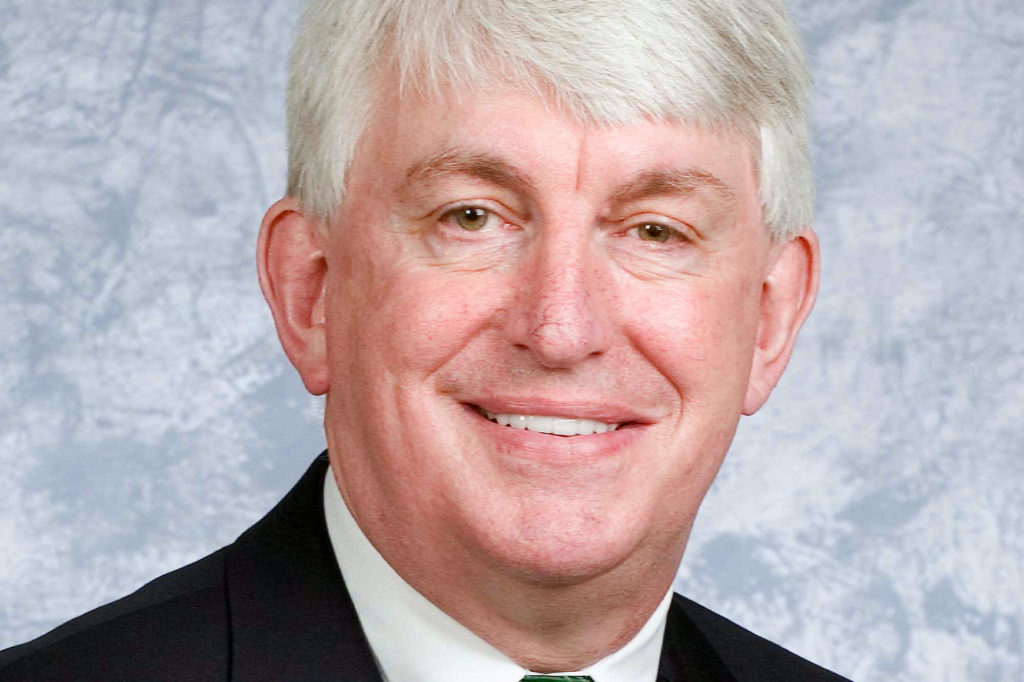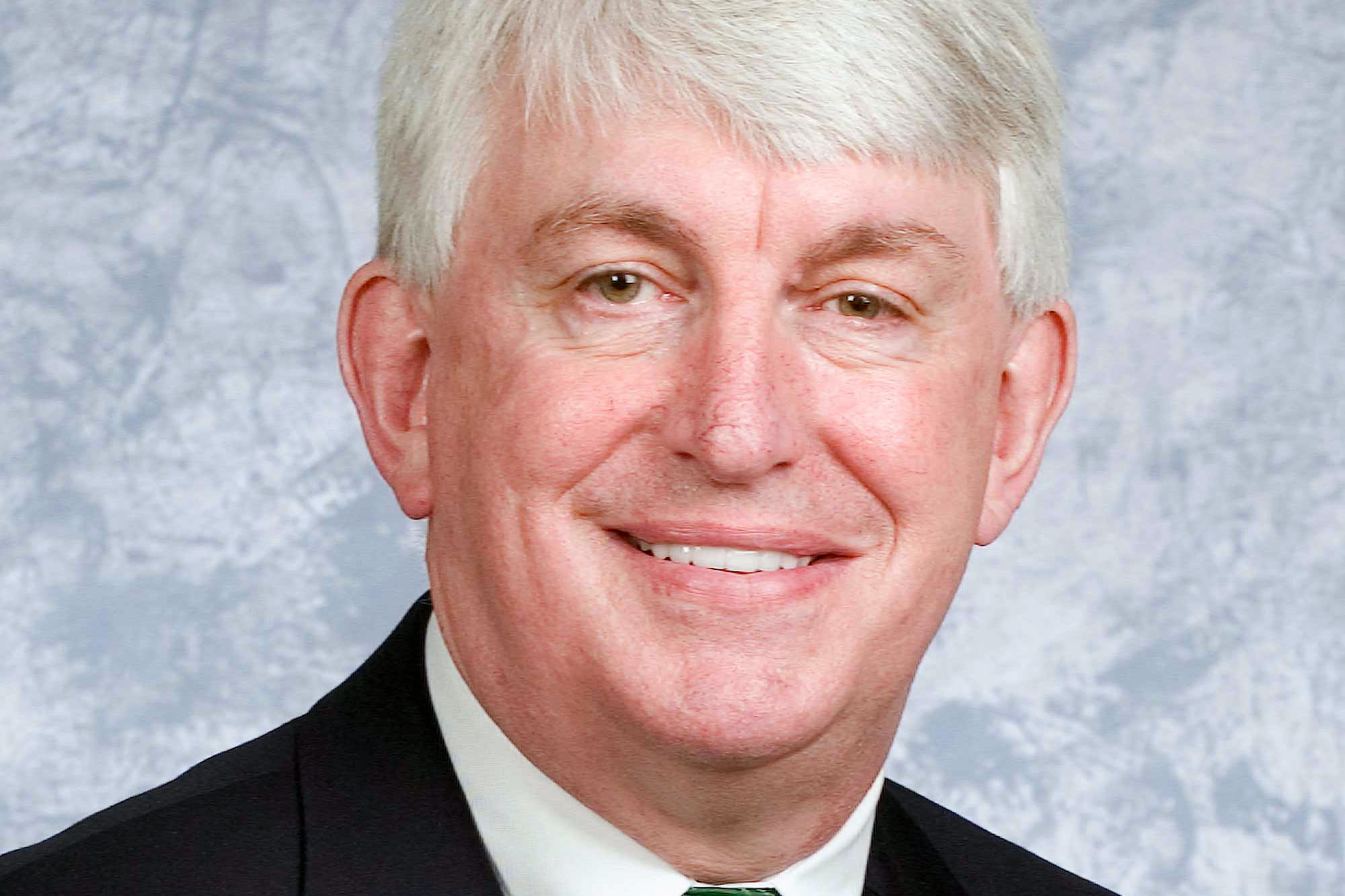
By Nancy McCann
When USF system President Steve Currall came to St. Petersburg on Aug. 30 to discuss consolidation, his second in command sat quietly in the audience.
Currall never introduced Provost Ralph Wilcox. If you didn’t recognize him, you wouldn’t have known he was there.
In hindsight, that seemed all the more curious when – 11 days later – Currall unveiled a proposed plan for consolidation that would put Wilcox in charge of St. Petersburg’s academic and student affairs.
Those sweeping responsibilities, which have belonged to a St. Petersburg-based executive for decades, would be moved to a silver-haired veteran of academic governance based 35 miles away in Tampa.
As some in St. Petersburg struggled to process both the core and the details of Currall’s “preliminary blueprint,” the campus was left to wonder: Who is Ralph Wilcox, and how would the campus fare under his leadership?
As if sensing the curiosity and fears, Wilcox has been meeting with groups of faculty and staff in St Petersburg.
On Sept. 20, it was faculty from the College of Education and staff from student success who met with him.
On his agenda next week is a meeting with faculty from the campus’ largest college – Arts and Sciences – on Sept. 26.
That meeting, like the others, will be private.
“It is not at all unusual” for Wilcox to meet with colleagues in St. Petersburg “on important university business, including consolidation,” said university system spokesman Adam Freeman.
“University employees are permitted to have meetings that aren’t open to the public or news media.”
At least one faculty member suggests that is a mistake.
“I’m saddened to learn that The Crow’s Nest will not be allowed” at the meeting, said Melanie Riedinger-Whitmore, a full professor and chair of the Department of Biology.
“Personally, I think that student reporters should be allowed to report on campus events that impact the educational opportunities and mission of USFSP.”
The meetings with Wilcox come at a perilous time for the St. Petersburg campus, which was stripped of its independent accreditation – effective next July – by the Legislature.
Under Currall’s tentative plan for consolidation, which he calls “USF as one university geographically distributed,” the general education curriculum is consistent across all three campuses, there is one office of admissions to recruit students and one office of student success.
His organizational chart shows all deans reporting to Tampa.
Meanwhile, Regional Chancellor Martin Tadlock would get a longer title – regional chancellor and vice president – but his “refreshed role” would leave him in charge of non-academic support staff and university “advancement” activities, like fundraising and alumni relations.
Tadlock’s sweeping authority would pass to Wilcox, 65, who as the top assistant to Currall and his predecessor, Judy Genshaft, has played a key role in consolidation planning.
Wilcox supported Genshaft’s position that USF St. Petersburg could be “somewhere in-between” a branch campus and a less prestigious instructional site when consolidation arrives next July.
This caused widespread concern in the St. Petersburg community and led to clarification by the Florida Legislature in June that USF St. Petersburg and USF Sarasota-Manatee must have the full authority of a branch campus as defined by the regional agency that accredits the university.
Although he is something of a mysterious figure to some in St. Petersburg, Wilcox once ran the campus.
When Genshaft ousted Bill Heller, the campus’ longtime chief executive, in 2002, she put Wilcox in his place with the title of interim vice president and campus executive officer.
Wilcox, who came to work for Genshaft after nine years as chair of the College of Education at the University of Memphis, had earned a bachelor’s degree from the University of Exeter in England (1977), a master’s from Washington State University (1978) and a doctorate from the University of Alberta in Canada (1982).
On his resume, he lists several key accomplishments during his year atop St. Petersburg.
His list of achievements includes helping establish a unique campus identity through programs of distinction; initiating plans for on-campus student housing, a campus welcome center, a student health center and a parking garage; and increasing the number of faculty from 124 to 171.
After a year in St. Petersburg, Wilcox returned to the Tampa campus as vice provost. He became provost and senior vice president for academic affairs in 2008, then provost and executive vice president in 2009.
When Currall replaced Genshaft as system president in July, one of the first things he did was extend Wilcox as provost for five years at an annual salary of $471,203.
Currall’s plans for consolidation – which he stressed are tentative and evolving – created a firestorm of opposition from some on the St. Petersburg campus and in the Pinellas County political and business communities.
That opposition continued last week.
In an editorial, the Tampa Bay Times called on Rep. Chris Sprowls, R-Palm Harbor, “the driving force” behind consolidation, to “remain engaged because the university’s preliminary plans short-change USFSP.”
In a letter to the newspaper, the campus’ former student affairs officer – Stephen Ritch – called Currall’s plan “a regressive model that is in some ways worse than the governance model that was in place when I joined USFSP” in 1984.
On Sept. 19, the St. Petersburg City Council weighed in.
It unanimously adopted a resolution calling on USF and the Legislature to follow the recommendation of the Consolidation Task Force and the mandate of the Legislature and ensure that St. Petersburg maintains its “distinct identity” and retains “the academic authority to make hiring and budget decisions.”
USF St. Petersburg is “a key economic driver” for the city, the council resolution says, and plays an integral role in what it calls “the city of St. Petersburg’s renaissance.”
Meanwhile, the faculty and staff of St. Petersburg’s Department of Journalism and Digital Communication asked Pinellas County legislators and department stakeholders to urge USF system leaders to revise the consolidation plan, which they said “imperils our department and our campus.”
The plan, the faculty declared in a letter, “removes academic decision-making from St. Petersburg and eliminates the Journalism Department.”
The plan “jeopardizes our professional accreditation, which depends on a formally defined unit with academic and budgetary authority,” the letter said.
“It threatens our award-winning independent newspaper, The Crow’s Nest, which has operated for 50 years. It also undermines the Neighborhood News Bureau, a project that provides students with practical learning experiences in the Midtown community.”
“As one of only four accredited journalism programs in Florida,” the letter said, “we seek to establish a Center of Excellence to advance innovation in community and digital journalism.”
Tadlock, who was permanently appointed regional chancellor in 2018 with an annual salary of $315,000, indicated he remains positive about the consolidation process.
He said he “felt very good about the questions asked and the resulting discussion” when some faculty and staff met with Wilcox on Friday.
“I am pleased that our student success staff and College of Education faculty spoke up and engaged in the conversation,” he said.
This article was updated on Sept. 23 to correct
Melanie Riedinger-Whitmore’s position. She is a full professor, not an associate.



